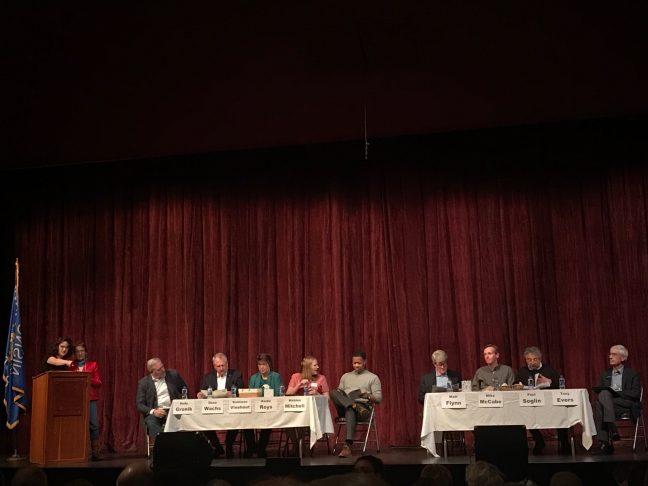Democratic Party candidates for governor met to discuss key issues of the 2018 election and to sell themselves to potential voters in a forum hosted by the East Side Progressives of Madison Sunday.
The forum, moderated by Rep. Melissa Sargent, D-Madison, hit on some of the key issues of the 2018 race, including environmental issues, job creation and retention, increasing income and racial diversity in the state’s postsecondary schools and student loan debt.
The forum ran on a question-and-answer format, with Sargent asking each of the candidates questions the East Side Progressives developed.
A common theme prevalent throughout the debate was the Democratic Party’s ability to win the governorship in 2018 after years of electoral failures. In the past eight years, Democrats in Wisconsin have lost three gubernatorial elections and two U.S. Senate races. Moreover, in 2016, a majority of the state voted for President Donald Trump.
Sen. Kathleen Vinehout, D-Alma, a candidate for governor who represents a state Senate district that voted for Trump in 2016 and for Gov. Scott Walker in all three of his gubernatorial races, said Democrats must speak more “progressive” in 2018 to energize Democrat voters who stayed home in 2016.
“We need to talk more Democratic — more progressive — as Democrats, and talk about things that really make a difference in people’s lives,” Vinehout said.
Vinehout said one of those things is higher education affordability. In responding to a question about how to keep young people in Wisconsin, Vinehout touted a bill she wrote in the state Senate that would make technical colleges and two-year University of Wisconsin campuses free for state residents.
Infrastructure was another key issue addressed at the forum. Former Rep. Kelda Roys, D-Madison, expressed disappointment with the current state of Wisconsin’s infrastructure. She cited a U.S. News & World Report finding, which ranked Wisconsin’s road quality as 49th out of the 50 states.
To remedy these problems, Roys suggested raising the tax on gasoline and putting those funds toward improving Wisconsin’s infrastructure.
“I think we need to look at raising the gas tax and reindexing it to inflation,” Roys said. “It was a terrible decision to stop doing that and that’s the only way we’re going to have the kind of roads businesses need, as well as everyday drivers.”
The candidates also discussed issues affecting struggling families throughout the state, most notably employment and income.
Another candidate, firefighters union head Mahlon Mitchell, said Walker’s campaign will focus on his record-low unemployment rate. But, he said such a rate means nothing if people are working multiple jobs or failing to make ends meet.
“We can’t just talk about unemployment rate — we have to talk about the quality of life,” Mitchell said. “An unemployment rate means nothing if people are working two, three jobs just to make ends meet.”
When candidates were asked what programs they would consider a funding priority in a hypothetical budget, many expressed a desire to increase funding for higher education and BadgerCare, a public health care program for low-income Wisconsinites.
Conversely, when candidates were asked which programs would be defunded, many pointed to the Wisconsin Economic Development Corporation.
WEDC was instrumental in the controversial decision to bring Foxconn, a Taiwanese technology company, to the Racine County village of Mount Pleasant. Many Democrats, including the candidates at the forum, were opposed to the Foxconn deal due to the lucrative tax breaks and investment it received from the state government.
Rep. Dana Wachs, D-Eau Claire, a candidate for governor who served on the WEDC board when the Foxconn deal was approved, said the organization would be eliminated under his administration.
“I would do away with WEDC,” Wachs said. “I’m on the WEDC board, I stood and fought Foxconn to their face. That board has a troubled history — it’s history when I’m governor.”
In a discussion surrounding the legality of recreational and medicinal marijuana in the state, all candidates supported legalizing medicinal marijuana. State Superintendent Tony Evers, however, was the only candidate who said he would leave the issue of recreational marijuana up to a statewide referendum vote.
Other candidates at the forum included Milwaukee businessman Andy Gronik, Madison Mayor Paul Soglin, former Democratic Party of Wisconsin Chair Matt Flynn and former head of the nonpartisan Wisconsin Democracy Campaign Mike McCabe.
The Democratic party gubernatorial primary will be held on Aug. 14, with the general election following on Nov. 6. The eventual Democratic candidate will presumably face Walker in the general election.


